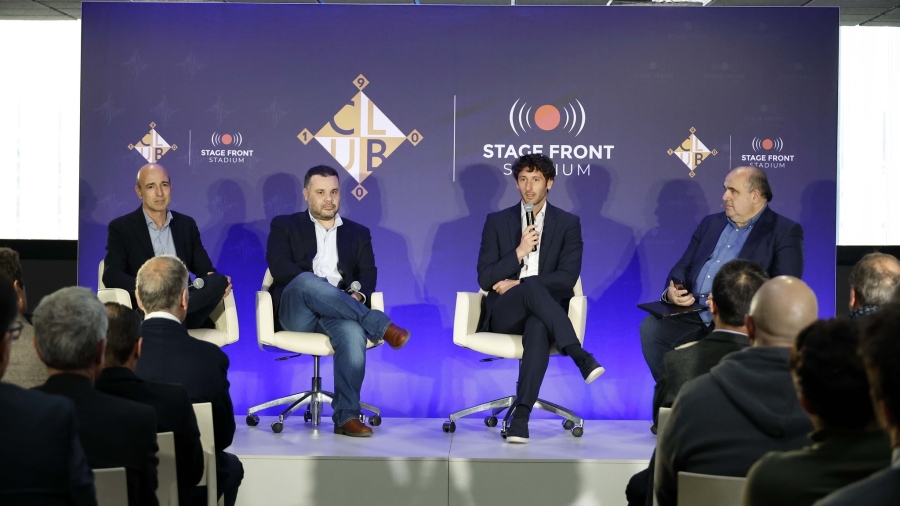
- More than a hundred attendees gathered at the Stage Front Stadium to listen to experts, including former RCD Espanyol footballer Esteban Granero, CEO of Olocip, a company dedicated to the implementation of Artificial Intelligence in sport.
- This is a space created by the club for discussing topics related to the football industry, and the latest interesting debate was on the new audiovisual era in the world of sport.
RCD Espanyol continue to demonstrate a desire to grow beyond the pitch. After launching their ‘Club 1900’ space in December, they have now held a second edition to further develop their brand strategy and to position the club in a way which reaches a wider audience. At a talk called ‘AI and the new audiovisual era in sport’, more than 100 people gathered at the Stage Front Stadium, including club representatives such as Mao Ye, CEO of RCD Espanyol, and Fran Garagarza, the sporting director.
The round table on Artificial Intelligence was moderated by Carlos Blanco, president of Encomenda VC, and it had the participation of Esteban Granero, a former player of RCD Espanyol and other LALIGA teams who is now CEO of Olocip; Gonzalo Zarza, Chief Data Officer at Sportian; and Miguel Rutllant, General Director of Lavinia and Clúster Audiovisual de Cataluña.
The Catalan club aims to turn this forum into a key reference for its followers, partners and fans. By presenting an innovative and forward-looking vision of the sports industry, and by discussing interesting topics, the club is managing to arouse the interest of its fanbase and those in the media.
Olocip CEO Esteban Granero participated and, after introducing himself, he thanked RCD Espanyol for the invitation and said: “AI performs two functions. On the one hand, it adds objectivity. In other words, it states how the actions of players influence the probability of scoring a goal for their team and how the performances of players affect a match, and AI objectifies this. Secondly, AI allows you to translate that analysis for the future and for different contexts. That allows you to reduce uncertainty about whether a signing is vital for a club, which is such a fundamentally important decision in a social, sporting and economic sense. It’s not a crystal ball, but it does bring you much closer to the future.”
Granero also talked about the origins of his company and the evolution of AI in football for both coaches and sporting departments. He explained: “Olocip was born to analyse the data of a football match in real time. We used to analyse with 80 variables what was happening in a match, having analysed thousands of matches previously, to anticipate what could happen in matches in the next 10 minutes. We did that seven years ago and the market was not ready to accept all that data. There are two main issues with this technology: firstly, it should be a tool aimed at helping you make a decision, rather than imposing a decision; secondly, the market, in this case the coaches, should understand that we are not trying to guess the future, and that it's about giving clues to reduce the uncertainty of the future and to give a recommendation. It seems that if you don’t get it right 100% of the time then the perception is you are not contributing anything.”
He continued: “If a coach in the future highlights the machine, he will be highlighting himself for having paid attention to a software recommendation. On the other hand, technology can complement sporting departments to provide a boost and a little more efficiency. AI will help sporting departments to make better decisions when looking at a signing, or to decide between several signings. It will take into account fewer variables and will have objectivity, more memory and be quicker to give an answer. It will be an effective tool.”
Another participant was Gonzalo Zarza, Chief Data Officer at Sportian, who said: “The main advantage of AI applied to sport is to reduce the cognitive load in certain moments of the game. You can have certain alarms for certain situations, from a tactical change of an opponent to the anticipated fatigue of a player. These automated alarms allow better decisions to be made. LALIGA currently provides clubs with software that allows them to see metrics in real time, a tool called Mediacoach. Nowadays, the main problem isn’t the availability of data, but the use of it and being able to rely on it.”
He also gave his view on how long it will take for AI to influence coaches’ decisions, stating: “There are certain conditions that algorithms can’t take into account, but I think in a large percentage of cases it will get it right. Then, the human factor comes in to play. I think having lots of real-time information to provide suggestions to the coach is very important. In one or two years, even less, I think we will see this in LALIGA. In the NBA, they even want to use AI to target fans to understand their emotional state, because they’ve realised that a fanbase that is engaged in the game and making a lot of noise is a three- or four-point competitive advantage when playing at home. They’re looking to give fans incentives, such as rewarding fans who wear NBA apparel and double that for home teams.”
Lastly, Miguel Rutllant, who is General Director of Lavinia and Clúster Audiovisual de Cataluña, analysed the possibilities of the new Artificial Intelligence tools and assessed the use of new audiovisual systems. He told the audience: “I think everyone has the same tools at their disposal, so what counts most is the human factor. It’s what organisation you have behind you, what culture there is, how creative you are, how many years you have been applying these tools... We can all have the same tools, but the results are not the same. In our case, our speciality is immersiveness. Virtual reality glasses are now very fashionable, as they allow you to create content to entertain, communicate, etc. We seek to maximise audiences, reach new people, provide excitement and make people come back. These new technologies help you to optimise all of this.”
